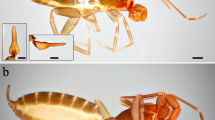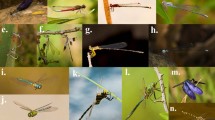Abstract
THE phenomenon of sexual polymorphism of zooids in cheilostomatous polyzoa is well known but not widespread, and so far only a few families are known to contain species whose zooids are modified according to their sexual condition. The occurrence of sexual polymorphism of zooids has been reviewed by Hyman1.
This is a preview of subscription content, access via your institution
Access options
Subscribe to this journal
Receive 51 print issues and online access
$199.00 per year
only $3.90 per issue
Buy this article
- Purchase on Springer Link
- Instant access to full article PDF
Prices may be subject to local taxes which are calculated during checkout
Similar content being viewed by others
References
Hyman, L. H., The Invertebrates, 5. Smaller Coelomate Groups (McGraw-Hill, New York, 1959).
Marcus, E., Bol. Faculd. Philos., Sci. e Letr., IV, Zool., 2, 1 (1938).
Rogick, M. D., Ohio J. Sci., 56(3), 183 (1963).
Silén, L., Ophelia, 3, 113 (1966).
Powell, N. A., Discovery Reports, 34, 1 (1967).
Author information
Authors and Affiliations
Rights and permissions
About this article
Cite this article
GORDON, D. Zooidal Dimorphism in the Polyzoan Hippopodinella adpressa (Busk). Nature 219, 633–634 (1968). https://doi.org/10.1038/219633a0
Received:
Issue Date:
DOI: https://doi.org/10.1038/219633a0
This article is cited by
-
A new Antarctic Osthimosia (Bryozoa, Cheilostomata, Celleporidae) with dimorphic zooids
Polar Biology (2009)
-
Growth of Flustra foliacea (Bryozoa)
Marine Biology (1971)
Comments
By submitting a comment you agree to abide by our Terms and Community Guidelines. If you find something abusive or that does not comply with our terms or guidelines please flag it as inappropriate.



